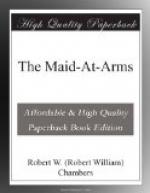“Then I was right!” he said, and flushed with pleasure when I offered him my hand.
“If I am not too free,” he muttered, taking my hand in his great, hard paw, almost affectionately.
“You may walk with us if you journey our way,” said Dorothy; and the great fellow shuffled up beside her, cap in hand, and it amused me to see him strive to shorten his strides to hers, so that he presently fell into a strange gait, half-skip, half-toddle.
“Pray cover yourself,” said Dorothy, encouragingly, and Mount did so, dumb as a Matanzas oyster and crimson as a boiled sea-crab. Then, doubtless, deeming that gentility required some polite observation, he spoke in a high-pitched voice of the balmy weather and the sweet profusion of birds and flowers, when there was more like to be a “sweet profusion” of Indians; and I nigh stifled with laughter to see this lumbering, free-voiced forest-runner transformed to a mincing, anxious, backwoods macaroni at the smile of a pretty woman.
“Do you bring no other news save of the birds and blossoms?” asked Dorothy, mischievously. “Tell us what we all are fearful of. Have the Senecas and Cayugas risen to join the British?”
Mount stole a glance at me.
“I wish I knew,” he muttered.
“We will know soon, now,” I said, soberly.
“Sooner, perhaps, than you expect, sir,” he said. “I am summoned to the manor to confer with General Schuyler on this very matter of the Iroquois.”
“Is it true that the Mohawks are in their war-paint?” asked Dorothy, maliciously.
“Stoner and Timothy Murphy say so,” replied Mount. “Sir John and the Butlers are busy with the Onondagas and Oneidas; Dominic Kirkland is doing his best to keep them peaceable; and our General played his last cards at their national council. We can only wait and see, Mistress Varick.”
He hesitated, glancing at me askance.
“The fact is,” he said, “I’ve been sniffing at moccasin tracks for the last hour, up hill, down dale, over the ford, where I lost them, then circled and picked them up again on the moss a mile below the bridge. If I read them right, they were Mohawk tracks and made within the hour, and how that skulking brute got away from me I cannot think.”
He looked at us in an injured manner, for we were striving not to smile.
“I’m counted a good tracker,” he muttered. “I’m as good as Walter Butler or Tim Murphy, and my friend, the Weasel, now with Morgan’s riflemen, is no keener forest-runner than am I. Oh, I do not mean to brag, or say I can match my cunning against such a human bloodhound as Joseph Brant.”
He paused, in hurt surprise, for we were laughing. And then I told him of the Indian and what message he had sent by us, and Mount listened, red as a pippin, gnawing his lip.
“I am glad to know it,” he said. “This will be evil news to General Schuyler, I have no doubt. Lord! but it makes me mad to think how close to Brant I stood and could not drill his painted hide!”




